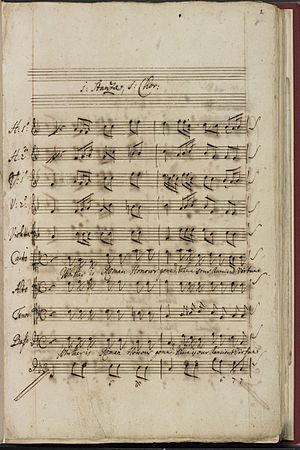Johann Ernst Galliard facts for kids
Johann Ernst Galliard (born around 1666 or 1687, died 1749) was a talented German composer. He wrote many different kinds of music during his life.
Contents
Early Life and Musical Start
Johann Ernst Galliard was born in Celle, Germany. His father was a French wig-maker. Galliard started learning about music composition when he was about 15 years old. He studied with important music teachers like Jean-Baptiste Farinel and Abbate Steffani. Farinel was the music director at the Court of Hanover.
Besides composing, Galliard was also a very good musician. He played the oboe and the recorder. He showed his talent when he played one of his own pieces. It was a "Sonata" for oboe and two bassoons. This performance happened at one of Farinel's concerts.
Moving to England and Royal Connections
Galliard's musical career grew. He earned a special place in the chamber music group of George, Prince of Denmark. Later, he moved to England. There, he became the chapel-master at Somerset House. This job meant he was often near the royal family. Because of this, Galliard became well-known in high society. He even wrote special music to celebrate war victories. These pieces included a Te Deum, a Jubilate, and three other anthems.
Musical Career and Challenges
Galliard helped start the Academy of Ancient Music. This seemed like a big step for his career. However, he faced tough competition. He could not become a director there because of famous composers like Handel and Bononcini.
A friend, the poet John Hughes, asked Galliard to write music for an opera. This opera was called Calypso and Telemachus. Other musicians liked the music, but the opera did not do well. This was because of "musical politics," which means disagreements or rivalries in the music world.
After this, Galliard focused more on playing his oboe. In 1713, he joined Handel's Italian Opera as a main soloist.
Later Works and Publications
Galliard continued to compose. He wrote several more "cantatas." These were pieces for singers, often based on poems by Hughes and Congreve.
He also published an opera. He wrote music for the Morning Hymn of Adam and Eve. This music was based on a famous poem by John Milton called Paradise Lost. Galliard also created many "pantomimes" (musical plays with acting and dancing). He made these for Rich, who managed the Lincoln’s-Inn-Fields Theatre.
Galliard's published music for instruments includes:
- Six Sonatas for a Flute and a Thorough Bass
- Six Solos for the Violoncello
- Six Sonatas for the Bassoon or Violoncello with a Thorough Bass for the Harpsichord
See also
 In Spanish: Johann Ernst Galliard para niños
In Spanish: Johann Ernst Galliard para niños
 | Calvin Brent |
 | Walter T. Bailey |
 | Martha Cassell Thompson |
 | Alberta Jeannette Cassell |


